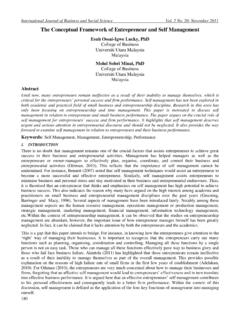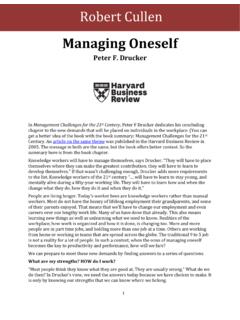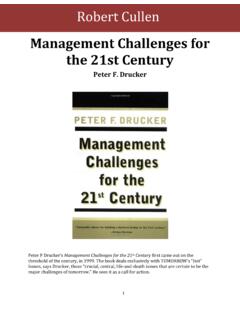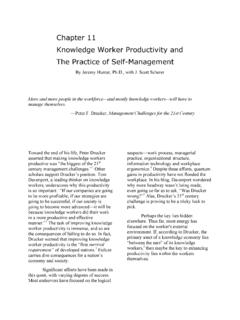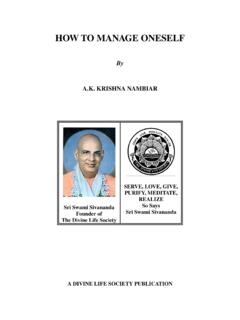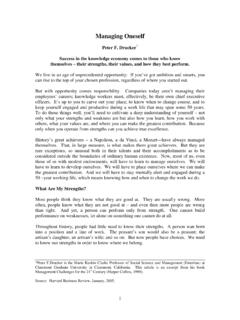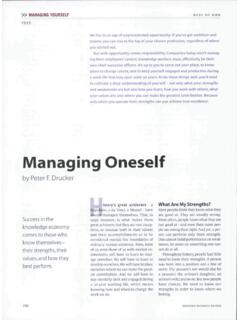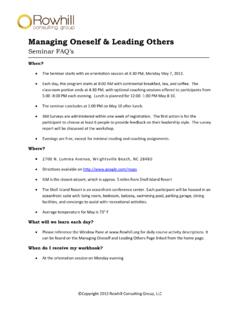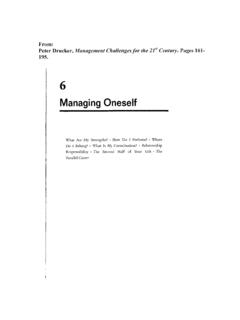Transcription of B EST OF HBR 1999 Managing Oneself - …
1 B EST OF HBR 1999 Managing Oneself by Peter F. Drucker Success in the knowledge economy comes to those who know themselves their strengths, their values, and how they best perform. Reprint R0501K B EST OF HBR 1999 Managing Oneself by Peter F. Drucker harvard business review Managing yourself january 2005page 1 COPYRIGHT 2004 HARVARD BUSINESS SCHOOL PUBLISHING CORPORATION. ALL RIGHTS RESERVED. Success in the knowledge economy comes to those who know themselves their strengths, their values, and how they best perform. We live in an age of unprecedented opportunity: If you ve got ambition and smarts, you can rise to the top of your chosen profession, regardless of where you started with opportunity comes responsibility.
2 Companies today aren t Managing their employ-ees careers; knowledge workers must, effec-tively, be their own chief executive officers. It s up to you to carve out your place, to know when to change course, and to keep yourself engaged and productive during a work life that may span some 50 years. To do those things well, you ll need to cultivate a deep understanding of your-self not only what your strengths and weak-nesses are but also how you learn, how you work with others, what your values are, and where you can make the greatest contribution. Because only when you operate from strengths can you achieve true excellence. History s great achievers a Napol on, a daVinci, a Mozart have always managed them-selves.
3 That, in large measure, is what makesthem great achievers. But they are rare excep-tions, so unusual both in their talents andtheir accomplishments as to be consideredoutside the boundaries of ordinary human ex-istence. Now, most of us, even those of us withmodest endowments, will have to learn tomanage ourselves. We will have to learn to de-velop ourselves. We will have to place our-selves where we can make the greatest contri-bution. And we will have to stay mentally alertand engaged during a 50-year working life,which means knowing how and when tochange the work we do. What Are My Strengths? Most people think they know what they aregood at.
4 They are usually wrong. More often,people know what they are not good at andeven then more people are wrong than yet, a person can perform only fromstrength. One cannot build performance onweaknesses, let alone on something one can-not do at history, people had littleneed to know their strengths. A person was Managing Oneself B EST OF HBR 1999 harvard business review Managing yourself january 2005page 2 Peter F. Drucker is the Marie Rankin Clarke Professor of Social Science and Management (Emeritus) at Claremont Graduate University in Claremont, Cali-fornia. This article is an excerpt from his book Management Challenges for the 21st Century (HarperCollins, 1999).
5 Born into a position and a line of work: Thepeasant s son would also be a peasant; the ar-tisan s daughter, an artisan s wife; and so now people have choices. We need toknow our strengths in order to know wherewe only way to discover your strengths isthrough feedback analysis. Whenever youmake a key decision or take a key action, writedown what you expect will happen. Nine or 12months later, compare the actual results withyour expectations. I have been practicing thismethod for 15 to 20 years now, and every timeI do it, I am surprised. The feedback analysisshowed me, for instance and to my great sur-prise that I have an intuitive understandingof technical people, whether they are engi-neers or accountants or market researchers.
6 Italso showed me that I don t really resonatewith analysis is by no means new. Itwas invented sometime in the fourteenth cen-tury by an otherwise totally obscure Germantheologian and picked up quite independently,some 150 years later, by John Calvin and Igna-tius of Loyola, each of whom incorporated itinto the practice of his followers. In fact, thesteadfast focus on performance and resultsthat this habit produces explains why the insti-tutions these two men founded, the Calvinistchurch and the Jesuit order, came to dominateEurope within 30 consistently, this simple methodwill show you within a fairly short period oftime, maybe two or three years, where yourstrengths lie and this is the most importantthing to know.
7 The method will show youwhat you are doing or failing to do that de-prives you of the full benefits of yourstrengths. It will show you where you are notparticularly competent. And finally, it willshow you where you have no strengths andcannot implications for action follow fromfeedback analysis. First and foremost, concen-trate on your strengths. Put yourself whereyour strengths can produce , work on improving your will rapidly show where you need toimprove skills or acquire new ones. It will alsoshow the gaps in your knowledge and thosecan usually be filled. Mathematicians are born,but everyone can learn , discover where your intellectual arro-gance is causing disabling ignorance and over-come it.
8 Far too many people especially peo-ple with great expertise in one area arecontemptuous of knowledge in other areas orbelieve that being bright is a substitute forknowledge. First-rate engineers, for instance,tend to take pride in not knowing anythingabout people. Human beings, they believe, aremuch too disorderly for the good engineeringmind. Human resources professionals, by con-trast, often pride themselves on their igno-rance of elementary accounting or of quantita-tive methods altogether. But taking pride insuch ignorance is self-defeating. Go to work onacquiring the skills and knowledge you need tofully realize your is equally essential to remedy your badhabits the things you do or fail to do that in-hibit your effectiveness and performance.
9 Suchhabits will quickly show up in the example, a planner may find that his beau-tiful plans fail because he does not followthrough on them. Like so many brilliant peo-ple, he believes that ideas move bulldozers move mountains; ideas showwhere the bulldozers should go to work. Thisplanner will have to learn that the work doesnot stop when the plan is completed. He mustfind people to carry out the plan and explain itto them. He must adapt and change it as heputs it into action. And finally, he must decidewhen to stop pushing the the same time, feedback will also revealwhen the problem is a lack of manners.
10 Man-ners are the lubricating oil of an is a law of nature that two moving bodies incontact with each other create friction. This isas true for human beings as it is for inanimateobjects. Manners simple things like saying please and thank you and knowing a per-son s name or asking after her family enabletwo people to work together whether theylike each other or not. Bright people, espe-cially bright young people, often do not un-derstand this. If analysis shows that some-one s brilliant work fails again and again assoon as cooperation from others is required, itprobably indicates a lack of courtesy that is,a lack of your expectations with your re-sults also indicates what not to do.
